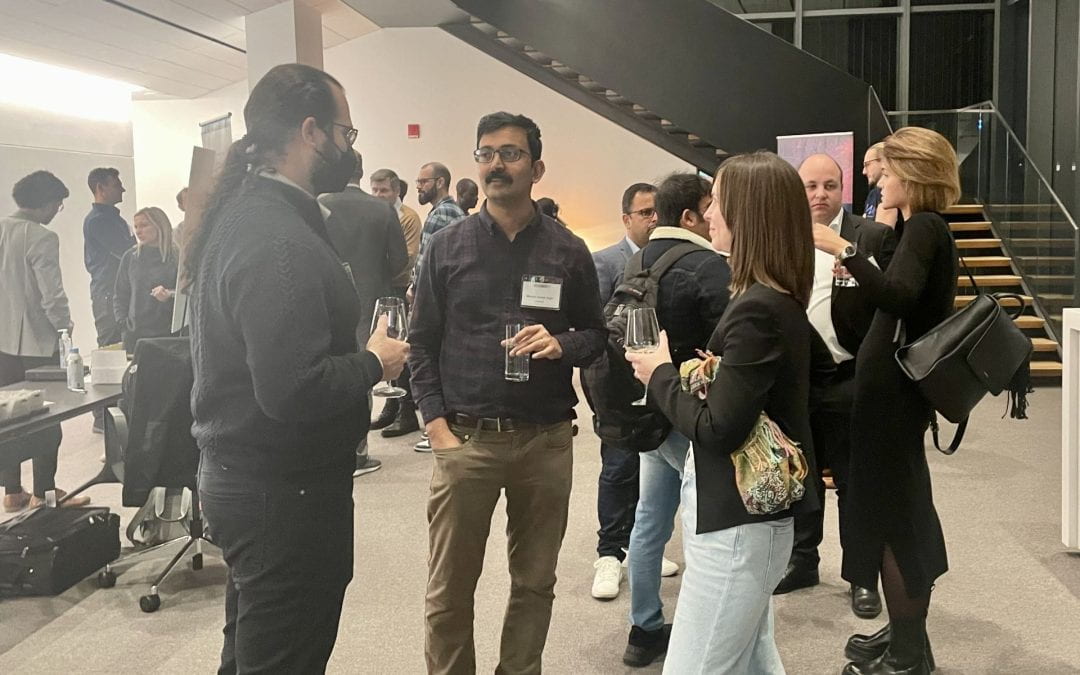Last Sunday, Duality hosted its first annual Corporate Collision, an event geared towards connecting quantum technology startups from Duality’s second cohort with industry experts. With representatives from corporate giants, researchers, and potential investors present, the startups used this event as an opportunity to form strategic connections and seek advice.
Over the course of the evening, each of the five companies in Cohort 2 gave a five-minute presentation on their milestones, goals, and challenges, followed by a period for Q&A. Afterwards, during a networking hour, the startups were able approach their audience of quantum innovators and businesspeople to discuss their cutting-edge technology and seek help with various aspects of company development.
Icosa Computing and Wave Photonics used their presentation windows to announce they are in the process of fundraising. With this goal in mind, Wave Photonics CSO Matthew Anderson noted that the event was a good opportunity “to get connected with companies that are interested in this space,” particularly “the corporate side of venture arms that might be interested in investing.”
Likewise, Quantescence was hoping to expand quantum emulator training and education programs, and SCALINQ was seeking industry partners with synergies. “The way forward is not reinventing the wheel behind closed doors, but opening up for collaborations,” noted Zaid Saeed, CEO of SCALINQ, on the importance of developing partnerships within the quantum industry.
Manish Singh, CEO of memQ, was looking to establish relationships within the financial industry and government to form potential client bases for his quantum memory technology. He believes that successful entrepreneurship is marked by a constant cycle of customer feedback. “It wouldn’t be very useful if you build something on the cutting edge and nobody wants it,” he said, emphasizing the importance of market input in the process of product development.
Corporate Collision allowed memQ, along with the other members of Cohort 2, to continue seeking valuable feedback from potential customers and partners. “I just had conversations with folks that are very impressed with what we’re doing, and we would not have had that conversation otherwise,” Singh said following the networking reception.
These conversations were also beneficial to the attendees, since they offered a glance at the state-of-the-art in quantum innovation. “There’s a lot of great research that’s starting to leave the lab that has the ability to move the field of quantum computing forward,” said Karen Kerr, Managing Director of VC firm Exposition Ventures. “This [event] is a great window into that work.”
Similarly, Justice Calderón, Startup Program Manager for IBM Quantum, was grateful for the ground-level glance at developing technologies. “Being a big company and having a broad landscape of ecosystems, it’s nice to come to this event and get to learn in depth about what is going on in the Chicago company ecosystem,” he said.
As homebase for institutions like the University of Chicago and Chicago Quantum Exchange, Chicago has continued to be a hotspot for quantum innovation. This year’s Corporate Collision was followed closely by the fifth annual Chicago Quantum Summit on November 14-15, which showcased a number of research and industry efforts in the space. “The Summit has been a great experience for meeting people who are in this ecosystem,” said Quantescence CEO Kevin Callaghan after the first day of programming on Monday. “The Chicago Quantum Exchange is growing, and I’m so happy to be a part of it.”

